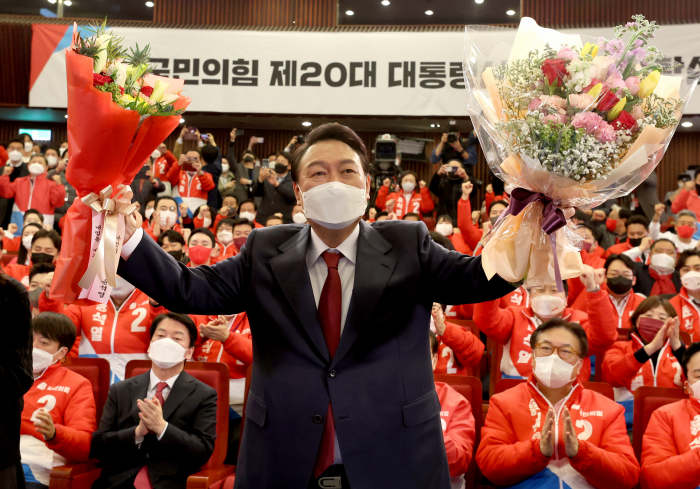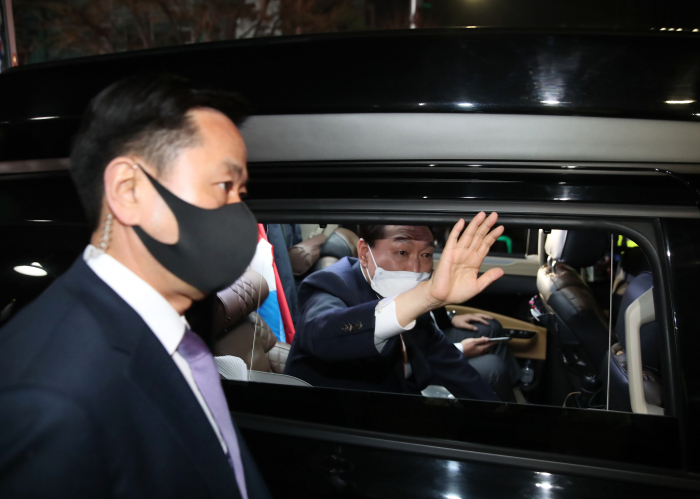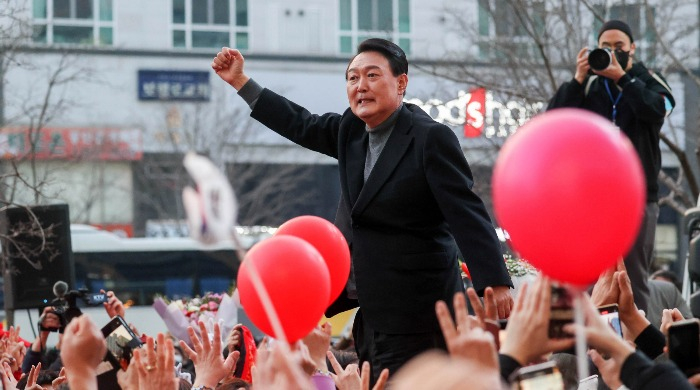Business & Politics
S.Korea's president-elect Yoon vows deregulation, tax cuts
The main conservative party's Yoon Suk-yeol promises to cut property taxes and allow digital currency issuance in S.Korea
By Mar 10, 2022 (Gmt+09:00)
6
Min read
Most Read
LG Chem to sell water filter business to Glenwood PE for $692 million


KT&G eyes overseas M&A after rejecting activist fund's offer


Kyobo Life poised to buy Japan’s SBI Group-owned savings bank


StockX in merger talks with Naver’s online reseller Kream


Meritz backs half of ex-manager’s $210 mn hedge fund



Former prosecutor general Yoon Suk-yeol on Wednesday was elected South Korea's next president, pledging drastic deregulation and investor-friendly measures for real estate and stock markets as well as digital services.
The main conservative party candidate, 61, narrowly beat the liberal contender Lee Jae-myung from the ruling Democratic Party, winning by the slightest margin in South Korea's presidential election history.
With 98 percent of the vote counted, Yoon had taken 48.59 percent of the vote against Lee of the liberal Democratic Party (DP)'s 47.79 percent.
Ruling party candidate Lee Jae-myung conceded defeat and congratulated Yoon in a statement read at the party headquarters.
Yoon of the People Power Party (PPP) will be sworn in on May 10 to begin his single five-year term.
Political experts said voters' dissatisfaction with Moon Jae-in's liberal administration led to the change in administration.
"This election reflects public demand for reform of our parliamentary politics," said Park Jihyang, honorary professor of Seoul National University's department of Western history.
"In the US and France too, voters' disillusionment with established politicians led to the election of non-mainstream leaders such as Donald Trump and Emmanuel Macron," she said.

Yoon's election may also herald the end of the long reign of current mainstream politicians known for leading South Korea's pro-democracy movement in the 1980s, some political analysts said.
"Voters expressed their discontent about the incapability and hypocrisy of the Moon Jae-in administration and their rebuke of the existing government by voting for political novice Yoon Suk-yeol," said Shin Yool, a social science professor at Myongji University in Seoul.
TAX CUTS FOR RETAIL STOCK INVESTORS, HOMEOWNERS
He also promised deregulation on short-selling and cryptocurrency trade, including allowing the issuance of digital coins in the country.
The incoming government plans to introduce a dual-class stock structure, allowing for two or more classes of shares with different voting rights, to help startup owners protect their management rights.
Rules on digital healthcare and contactless medical services will be loosened, whereas regulations on Big Tech platforms will be tightened to level the playing field with established financial services firms.
Regarding energy, he is supportive of nuclear power and the adoption of smaller modular reactors, in contrast with the Moon administration's nuclear phaseout plan.

FROM HARD-LINE PROSECUTOR TO PRESIDENT
Yoon will become South Korea's first president with no political experience, excluding the two late military dictators: Park Jung-hee and Chun Doo-hwan.
He served as prosecutor-general under President Moon Jae-in between July 2019 and March 2021.
During his 27-year career as a prosecutor, he played a key role in investigations into high-profile corruption scandals at the country's top conglomerates from Samsung to Hyundai Motor and SK, which led to the indictment of several group chairpeople.
In particular, Yoon rose to fame for his role in the probes that led to the imprisonment of two former South Korean presidents and brought down the government of conservative President Park Geun-hye in 2017.
But he resigned in March 2021 as prosecutor-general, four months before the end of his term, after indicting key presidential aide and ex-Justice Minister Cho Kuk on charges of bribery and document fraud.
Soon after he quit the post, he launched his presidential campaign and won the primary of the main opposition party PPP in November 2021.
He studied law at the country's prestigious Seoul National University and in 1991 passed the bar on his ninth attempt.
Just a few days before the election, Yoon joined forces with minor presidential candidate Ahn Cheol-soo, a medical doctor-turned-entrepreneur, who pulled out of the race to throw his support to the main conservative candidate Yoon.
The tight race meant Yoon failed to win support from nonpartisan voters and may lead to a hostile co-existence with the Democratic Party, said Park Won-ho, assistant professor of Seoul National University's department of political science and government.
Yoon may also find it difficult to push ahead with his campaign pledges in the current parliament until the 2024 general elections. The ruling Democratic Party holds a majority in the National Assembly,
Below are the key economic promises made during his presidential campaign:
HOUSING MARKET
He pledged to supply 2.5 million new homes during his five-year term, including 1.5 million units in the Seoul Metropolitan Area, and to stabilize home prices by easing regulations on reconstruction and redevelopment.
Taxes on property ownership and capital gains from property transactions will be reduced.
STOCK MARKET
Capital gains taxes for individual stock investors will be abolished and securities transaction taxes will be lowered.
Rules on spin-offs will be toughened: The existing shareholders of a parent company will be offered new shares in the spun-off unit ahead of other investors.
SHORT-SELLING
The incoming government will consider introducing a circuit breaker to temporarily halt the short-selling of shares with sharp price drops.
Collateral requirements for individual investors' short-selling will be eased to similar levels of those for institutional investors.
CRYPTOCURRENCIES
Capital gains of up to 50 million won ($40,500) from cryptocurrency trade will be tax-free.
Initial coin offerings will be allowed.
South Korea-based entities will be allowed to issue new digital currencies in the country, starting with crypto exchanges.
STARTUPS
A dual-class stock structure, allowing for two or more classes of shares with different voting rights, will be introduced to help startup owners protect their management rights.
Up to 200 million won worth of stock options provided to employees will be tax-free, four times as much as the current 50 million won tax exemption limit, to help startups attract talent.
FACILITY INVESTMENT
Generous tax benefits will be offered to semiconductor R&D centers and new facility investments
DIGITAL HEALTHCARE
Regulations will be relaxed on digital healthcare services and contactless medical treatments.
BIG TECH PLATFORMS
Yoon plans to toughen regulations on large-sized platform companies, including fintech operators, to level the playing field with established financial services companies.
PANDEMIC-HIT SMALL BUSINESSES
Yoon has promised to provide 50 trillion won ($41 billion) in loans and another 43 trillion won in cash handouts to small business owners to ease pandemic-caused losses.
Write to Dong-Wook Jwa and Kyung-Mok Noh at leftking@hankyung.com
Yeonhee Kim edited this article.
More to Read
-
 Business & PoliticsMain opposition leads ruling party in poll ahead of 2022 election
Business & PoliticsMain opposition leads ruling party in poll ahead of 2022 electionNov 09, 2021 (Gmt+09:00)
3 Min read -
 Digital assetsPresidential candidates vow to legislate digital assets
Digital assetsPresidential candidates vow to legislate digital assetsJan 20, 2022 (Gmt+09:00)
5 Min read
Comment 0
LOG IN


